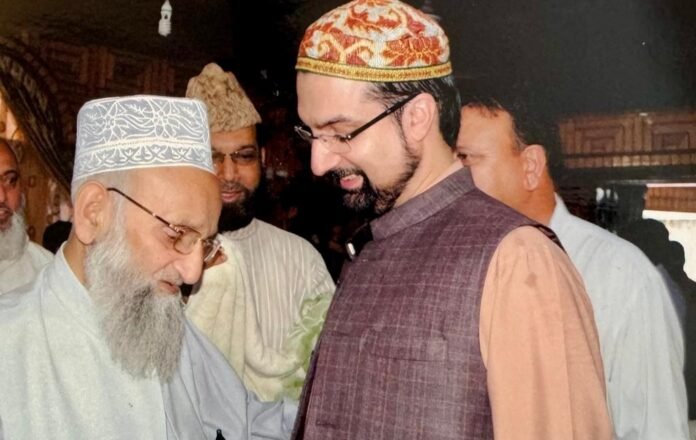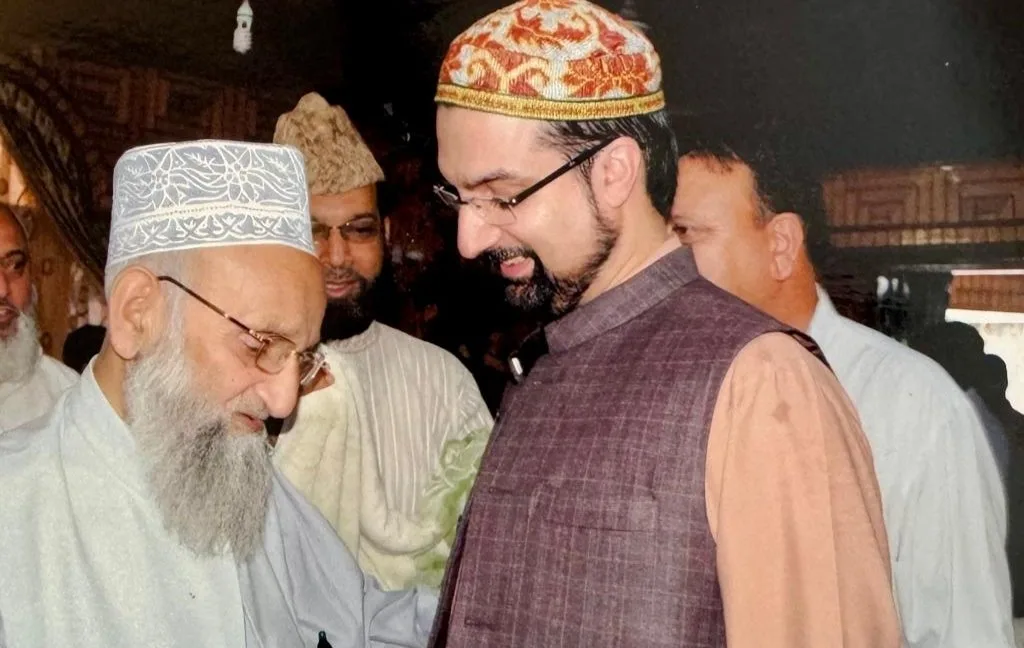
His life exemplified the virtues he imparted, leaving an enduring impression on those who had the privilege of knowing him
“A person who is not thankful towards people can never be thankful towards the almighty.” – Prophet Mohammad (PBUH)
It makes me sad that since the time I was placed under house arrest — and my Wa’az-o-Tableegh was proscribed — in August 2019 under the new dispensation in Kashmir, I was not able to meet Mahad Sahab. He too was extremely anguished by this and would speak with me on the phone.
Written by Mirwaiz Umar Farooq
Ghulam Mohiuddin Wani, also known as Mahad Sahab, passed away in Srinagar on December 17. He shaped my spiritual path at one of the most crucial and critical junctures of my life. I need to acknowledge him in the most generous way possible for, besides being my teacher, mentor and guide in religious matters, he epitomised the finest confluence of Islamic belief and spiritual practice, moderation and a deep sense of responsibility towards traditions and culture.
It was not easy for me to inherit the mantle of the Mirwaiz (chief cleric) when my father Mirwaiz Maulvi Mohammad Farooq attained martyrdom in 1990. I was a playful 17-year-old schoolboy. In a situation when we were bereft and grieving, I was suddenly enjoined to take over the responsibility of carrying forward the hallowed religious obligation of upholding the mission of the Mirwaizeen-e-Kashmir. The institution of the Mirwaiz is unique to Kashmir. In an unbroken tradition of over a century now, the revered pulpit has been guiding believers. It was a journey that demanded of me an overnight transformation from being a teenager to ascending the esteemed pulpit of Jamia Masjid, the historic mosque located in the heart of Srinagar city.
That was when Mahad Sahab stepped in and contributed immensely towards making that transition smooth. Being a close associate of my father and a committed adherent of the Mirwaiz family’s religious legacy, he volunteered his services to mentor me. He held me by the hand and hoisted me up the ladder to the Mirwaiz’s pulpit. A self-taught man, Mahad Sahab was a devout businessman. When it came to matters of faith and practice, he was unique in many ways. Although he belonged to the more orthodox Salafi school of thought (Ahl-e-hadees), he was of a Sufi temperament, dedicated to understanding the teachings of Islam as a means to get close to Allah with humility and gratefulness.
He possessed great reverence for Sheikh Abdul Qadir Jeelani, Khwaja Bahauddin Naqshbandi and other Sufi peers. He would guide me in compiling a Wa’az (sermon) for the special occasion of the urs of the Sufi peers and would make it a point to participate in the congregation. I would observe him engrossed in the Wa’az, which he had helped to compile with great attention and devotion. Later, he would tell me, “I experience a very different feeling when you are at the mimbar (pulpit) and recite from the bayaz (teachings)”.
Immediately after my father’s death, my first sermon at Jamia Masjid from the teachings of Mirwaiz Ahmadullah, was in Kashmiri. Although I could speak the language, I was not fluent in writing or reading it. Mahad Sahab ensured I was introduced to verses written by Kashmir’s leading saint, Sheikh-ul-Alam also known as Sheikh Nooruddin Wali. This became an entry point for me into the Kashmiri language. It was followed by an introduction to Persian, especially the writings of Jami, Khusrau and Rumi.
Being a Mirwaiz requires special learning that no ordinary school or university can impart. The clerical tradition adopted the unique form of Wa’az-o-Tableegh (propagation through sermons) to educate people and bring the teachings of Islam to them. The distinctiveness was in the fact that it was completely based on the oral conventions of listening, repetition and absorption. This system continues without any distortion. A Wa’az puts special emphasis on the life of the Prophet (PBUH) and is suffused with reverence, devotion, love and praise for him. It also delves into the role and significance of the pious and learned saints and scholars of Islam. The language traditionally has been Kashmiri and Persian, recited at specific moments during the Wa’az, giving a unique structure to the recitations.
As I embarked on this extraordinary journey of becoming a Mirwaiz, an intense period of initiation and education came from Mahad Sahab. He introduced me to this knowledge system with its etiquette and nuances. The qutab khana (library) at the Mirwaiz Manzil is home to a rich collection of manuscripts, some of which are over 400 years old. These manuscripts and bayaz are a treasure of Islamic learning and calligraphy. Mahad Sahab was well-versed in these and cherished and valued them. I would be deeply impressed by his knowledge and understanding as he traversed through the manuscripts of Mirwaiz Rasool Shah, Mirwaiz Ahmadullah or Mirwaiz Atiqullah and steered me through them. He would emphasise that moderation and balance were the key messages that came through the religious practice and teachings of the Mirwaizeen. He would guide me through these ancient manuscripts and prepare my sermons for the contemporary congregation. He was among the few people who knew the oral tradition of passing on the local knowledge, known as Seena ba Seena.
It was through a process of osmosis, through oral repetition and listening, that he had imbibed the institution, its methodology and structure. It was through the same process that he transferred the knowledge system to me. We would have a learning session every day before he would begin his day at his shop. His gift of the repertoire of Manajaat, Na’at and Manqabat in Kashmiri, Persian and Arabic opened up a new world for me.
It makes me sad that since the time I was placed under house arrest — and my Wa’az-o-Tableegh was proscribed — in August 2019 under the new dispensation in Kashmir, I was not able to meet Mahad Sahab. He too was extremely anguished by this and would speak with me on the phone. Now, with his death, the precious 33 years of association have come to an end. His life exemplified the virtues he imparted, leaving an enduring impression on those who had the privilege of knowing him.
And I have lost my guiding light.
Related

